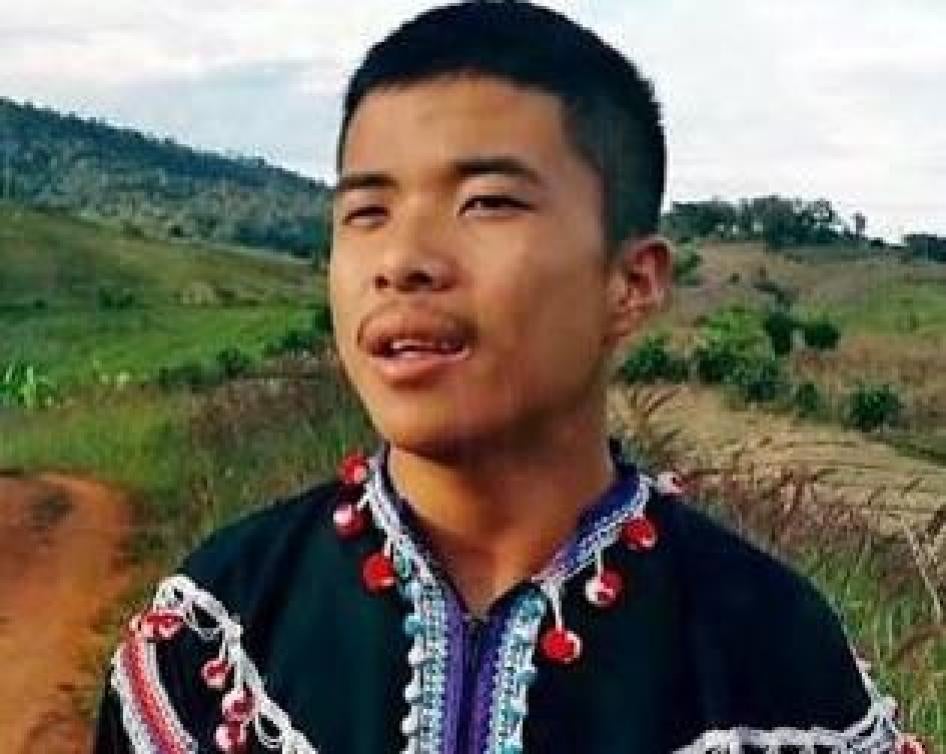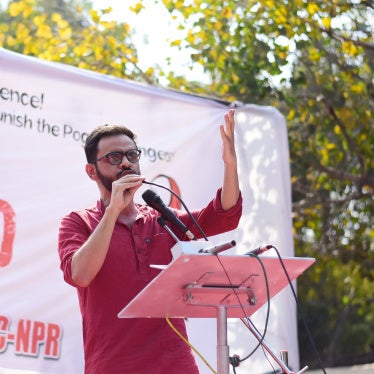(New York) – Thai authorities should immediately and transparently investigate the shooting death of a teenage ethnic Lahu activist who had been detained by the military, Human Rights Watch said today. Chaiyaphum Pa-sae, 17, was shot to death on March 17, 2017 after soldiers apprehended him for alleged drug possession in Chiang Dao district of Thailand’s northern Chiang Mai province.
Soldiers from the army’s 5th Cavalry Regiment Task Force and the Pha Muang Task Force reported to the district police that they stopped a car at Ban Rin Luang village checkpoint in which Chaiyaphum was a passenger. Soldiers claimed that a search found 2,800 methamphetamine pills hidden in the car’s air filter. Chaiyaphum and the driver, Pongsanai Saengtala, were detained while the soldiers continued to search the car.
The soldiers said that Chaiyaphum escaped from the soldiers, pulled a knife out of the car’s trunk, fought his way past them, and ran into the nearby jungle. Soldiers claimed that they pursued him and when Chaiyaphum was about to throw a hand grenade at them, shot him in self-defense. They have not explained how a detained person obtained the knife or grenade. The coroner confirmed that Chaiyaphum was struck by an M16 assault rifle round that pierced his left arm and struck his heart.
“The claim that soldiers killed an outspoken young ethnic activist in self-defense after he had been held by soldiers sets the alarm bells ringing,” said Brad Adams, Asia director. “Instead of accepting at face value the account of the soldiers who shot Chaiyaphum, the authorities need to thoroughly and impartially investigate this case and make their findings public.”
Chaiyaphum was a well-known activist from the Young Seedlings Network Camp in Chiang Dao district. He was involved in numerous campaigns to promote the rights of ethnic Lahu and other vulnerable ethnic minorities in northern Thailand to gain citizenship, health care, and access to education. He also spoke out against abuses by Thai security forces against his community during anti-drug operations. In addition, Chaiyaphum was a documentary producer and music composer. Several of his short films, including “A Comb and A Buckle,” were shown on the Thai PBS channel.
Ethnic minorities in Thailand will never have full equality so long as those acting on their behalf face grave risks every day and killings such as this are not investigated properly.
Brad Adams
Asia Director
The United Nations Basic Principles on the Use of Force and Firearms by Law Enforcement Officials, which apply to soldiers acting in a law enforcement capacity, state that security forces shall as far as possible apply nonviolent means before resorting to the use of force. Whenever the lawful use of force is unavoidable, the authorities should use restraint and act in proportion to the seriousness of the offense. Lethal force may only be used when strictly unavoidable to protect life. In cases of death or serious injury, a detailed report shall be sent promptly to the competent authorities responsible for administrative review and judicial control.
In addition, the Thai government has an obligation under the UN Declaration on Human Rights Defenders to ensure that any individual or group working to protect and promote human rights is able to work in a safe and enabling environment.
The Thai army has a longstanding practice of dismissing allegations of serious abuses committed by its troops. Despite numerous complaints about human rights violations by soldiers and army-affiliated militia groups during anti-drug operations, the army has rarely prosecuted military personnel for such offenses.
Human Rights Watch documented numerous extrajudicial killings and other serious human rights violations during then-prime minister Thaksin Shinawatra’s “war on drugs” in 2003 and 2004. Abusive anti-drug operations by the armed forces and police continued across Thailand under successive governments after Thaksin was ousted in a military coup in 2006. Many of those killed were members of ethnic populations in northern provinces who were known to have disputes with local authorities and who had consequently been blacklisted as suspected drug traffickers. Many of them were killed at checkpoints or soon after being summoned to report to local military bases or police stations for questioning.
Human Rights Watch’s findings were echoed by the 2007 Independent Committee for the Investigation, Study and Analysis of the Formation and Implementation of Drug Suppression Policy (ICID), chaired by former Attorney General Khanit na Nakhon, and in National Human Rights Commission reports.
The government should immediately direct the Department of Special Investigation to investigate Chaiyaphum’s death, and also request the National Human Rights Commission to investigate the case. Human Rights Watch also urged the government to ensure the safety of witnesses in this case, including the driver of the car, Pongsanai, who is now detained at Mae Taeng Prison in Chiang Mai province.
“Abusive officials have long used anti-drug operations to cover their attacks on activists who exposed official wrongdoing or defended minority rights,” Adams said. “Ethnic minorities in Thailand will never have full equality so long as those acting on their behalf face grave risks every day and killings such as this are not investigated properly.”









